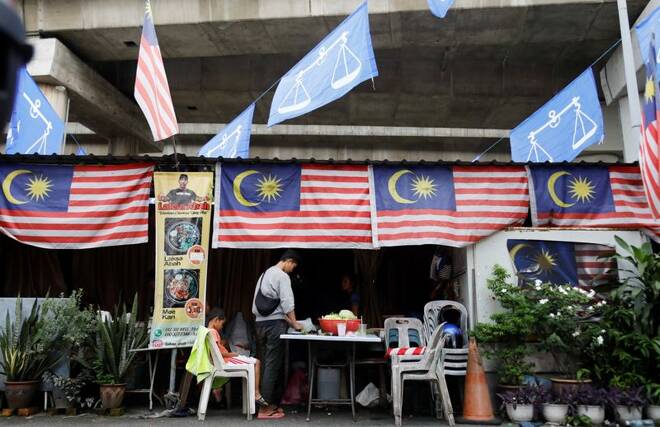Advertisement
Advertisement
In Malaysia election, economy is priority for voters tired of instability
By:
By Ebrahim Harris KUALA LUMPUR (Reuters) - Malaysian livestock and animal feed trader Zamri Haron lost 400,000 ringgit ($87,241.00) in heavy rains and floods last December that damaged his equipment and spoiled his stocks.
By Ebrahim Harris
KUALA LUMPUR (Reuters) – Malaysian livestock and animal feed trader Zamri Haron lost 400,000 ringgit ($87,241.00) in heavy rains and floods last December that damaged his equipment and spoiled his stocks.
He received no government aid, and was forced to borrow money from friends and family to pay his workers and run the business.
As he casts his ballot in the national election on Saturday, Zamri said he will be choosing a candidate who can help deal with financial losses and a slowing economy.
“As traders ourselves, we don’t see the government helping or providing (aid). What we expect from the candidate who will lead this area is to be honest and help people,” said Zamri.
Economic prospects and rising inflationary pressures are the top issues for Malaysians in the Nov. 19 election that comes amid an expected slowdown in growth.
Malaysians are also frustrated with recent political instability that they think has taken politicians’ focus away from economic development.
Since 2018, Malaysia has seen three prime ministers and the collapse of two coalitions due to power struggles between factions.
This election is set to be a highly competitive race between three major coalitions led by incumbent Prime Minister Ismail Sabri Yaakob, long time opposition leader Anwar Ibrahim and former premier Muhyiddin Yassin.
Ismail’s Barisan Nasional coalition, which was defeated in the last election in 2018 due to widespread corruption allegations, is trying to restore its image as the safest pair of hands for managing the economy.
Former premier Najib Razak, who is with Barisan, is in jail serving a 12-year sentence for graft over the multi-billion-dollar scandal at state fund 1MDB. Several other coalition leaders also face corruption charges.
Anwar and Muhyiddin had worked together to bring down Najib in 2018, and were allied in the subsequent short-lived coalition government headed by the venerable Mahathir Mohamad, Malaysia’s longest-serving prime minister, who is again contesting at the age of 97.
Barisan has promised to provide monthly aid to lower-income households, free childcare and early education, and reduce taxes in an effort to address the voters’ inflation concerns.
Opposition leader Anwar has also vowed to prioritise the economy and inflation. His coalition said it would offer production incentives and eliminate cartels to alleviate rising prices of food essentials.
About 74% of Malaysians surveyed by independent pollster Merdeka Center identified ‘economic concerns’ as the country’s biggest problem.
Inflation and enhancing economic growth were in the top five voter concerns, according to the Merdeka poll conducted in October.
“Cost of living will definitely be something that the new government will have to focus on,” said Arinah Najwa Ahmad Said, senior analyst at political risk consultancy Bower Group Asia.
The new government will also have to address unemployment benefits as companies lay off employees in anticipation of difficult times ahead, she said.
($1 = 4.5850 ringgit)
(Writing by A. Ananthalakshmi; Editing by Simon Cameron-Moore)
About the Author
Reuterscontributor
Reuters, the news and media division of Thomson Reuters, is the world’s largest international multimedia news provider reaching more than one billion people every day. Reuters provides trusted business, financial, national, and international news to professionals via Thomson Reuters desktops, the world's media organizations, and directly to consumers at Reuters.com and via Reuters TV. Learn more about Thomson Reuters products:
Latest news and analysis
Advertisement
